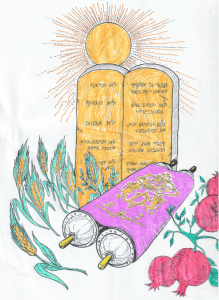Shavuot is celebrated seven weeks and one day after Passover. Shavuot is a one day celebration in Israel and two days in the Diaspora (outside of Israel).

Shavuot is known by other names:
- Chag HaShavuot – (The Feast of Weeks)
- Chag HaBikurim – (The Festival of First Fruits)
- Chag HaKatzir – (The Harvest Festival)
The night before Shavuot is dedicated to the study of the Torah. This tradition is let HaShem know that we want to study his Torah and we start at sundown beginning Shavuot and many study throughout the night showing their dedication.
Shavuot is 50 days after Passover (the 6th of Sivan) and the word Shavuot means “weeks” because it is 7 weeks after Passover.
The Torah tells us that we celebrate this holiday because of the giving of the Torah on Mount Sinai. In Exodus chapter 19 and 20 we are told that HaShem gave us the commandments.
It is an interesting fact that the holiday celebrates the “giving” of the Torah, rather than “receiving” it. Our sages pointed out that we are constantly “receiving” the Torah but that this was the first time that we were “given” the Torah and that is why the holiday is special.
Today Shavuot is celebrated in synagogues around the world by reading the Book of Ruth and a very beautiful poem called Akdamut.
Eating Dairy
It is a custom to eat at least one dairy meal during Shavuot. There are to main stories given for the dairy meal. One is that it is a reminder of the promise about the land of Israel flowing with milk and honey. Another story for the dairy meal is that when we received the Torah and then knew the laws of Kashrut, we could eat only a dairy meal because there was no kosher meat available.
Bikkurim Festival
Many synagogues have their religious schools participate in a Bikkurim festival. The children march around holding baskets of fruit which are placed on the bimah and later donated to hospitals or the poor. This is to remind us that Shavuot is one of the three pilgrimage holidays when in ancient times Jews brought their first fruits to the Temple as an offering to HaShem. The first fruits were called Bikkurim.
Decorating with flowers and plants
Shavuot’s significance as an agricultural festival is seen by bringing the outdoors inside. Homes and Synagogues are decorated with a variety of plants, flowers and greenery. School children wear flower garlands around their necks and help decorate the house and school with plants and leaves.
Tradition says that the reason for decorating with plants and flowers is that when the Torah was given at Mount Sinai, the barren desert bloomed with flowers as the earth itself rejoiced.
A Torah all night party
The Midrash tells us that the Israelites overslept on the day that they received the Torah. It has become a custom to stay up all night and read and discuss the Torah to show HaShem that we are excited to receive the Torah.
Confirmation
Shavuot is also a time that many reconfirm their commitment to Judaism. Reform Jews and some others celebrate a confirmation ceremony in which 10th graders affirm their commitment to the Torah and to Judaism.

